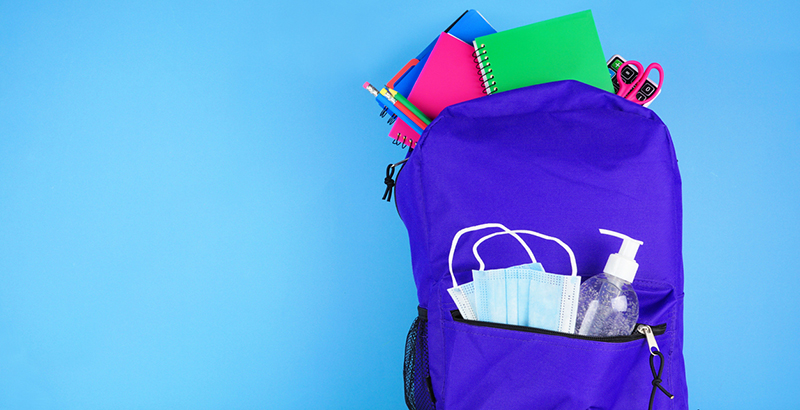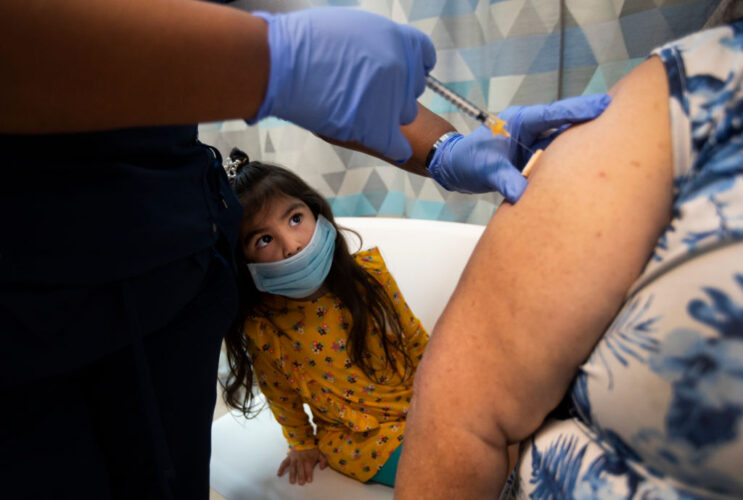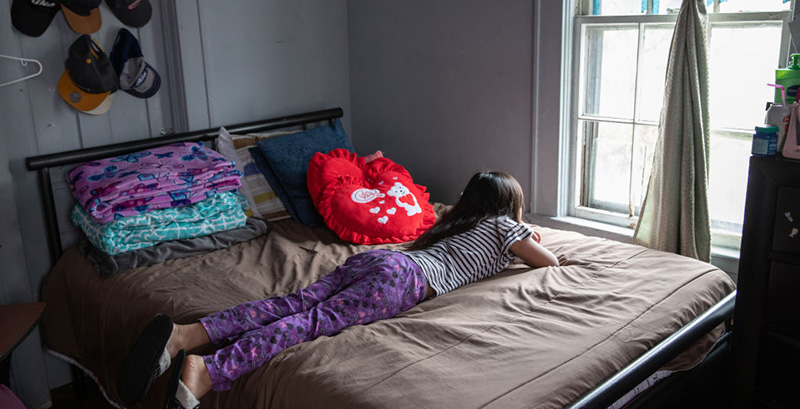COVID Brief: Vaccines for Children Under 5 Could Be Ready as Soon as This Month
A weekly roundup of headlines about how the pandemic is shaping schools and education policy, vetted by AEI Visiting Fellow John Bailey

Today’s Top Story

Vaccines for Children Under 5 Could be Available by End of June
- Pfizer says three doses of its COVID vaccine are more than 80% effective in kids under 5
- The Food and Drug Administration set June 14-15 as the new meeting date to review Moderna and Pfizer’s emergency use authorization.
- Meg Tirrell has a comparison of what we know about Pfizer and Moderna shots for young kids as of now:
- Age: Pfizer 6 months to under 5 years; Moderna 6 months to under 6
- Dose: Pfizer 3 x 3 micrograms; Moderna 2 x 25 micrograms
- Efficacy: Pfizer 80% (preliminary); Moderna 37%-51%
- FDA status: Pfizer filed this week; Moderna is under review
- Stat: “Assuming one or both are approved, that could mean parents of children under 5 who have been anxiously waiting to have their children vaccinated may finally be able to do so around the beginning of the fourth week of June.”
- Possible timeline: “A top Biden administration health official, anticipating that federal regulators will soon authorize coronavirus vaccines for children younger than 5, said Thursday that the first doses could become available as early as June 21, and that states can begin ordering them from the Biden administration beginning on Friday,” The New York Times reported.
The Big Three

Kids Are Far, Far Behind in School: Via Thomas Kane in The Atlantic
- “The achievement loss is far greater than most educators and parents seem to realize. The only question now is whether state and local governments will recognize the magnitude of the educational damage and make students whole. Adults are free to disagree about whether school closures were justified or a mistake. But either way, children should not be stuck with the bill for a public health measure taken on everyone’s behalf.”
- “One-fifth of American students, by our calculations, were enrolled in districts that remained remote for the majority of the 2020-21 school year. For these students, the effects were severe. Growth in student achievement slowed to the point that, even in low-poverty schools, students in fall 2021 had fallen well behind what pre-pandemic patterns would have predicted; in effect, students at low-poverty schools that stayed remote had lost the equivalent of 13 weeks of in-person instruction. At high-poverty schools that stayed remote, students lost the equivalent of 22 weeks. Racial gaps widened too: In the districts that stayed remote for most of last year, the outcome was as if Black and Hispanic students had lost four to five more weeks of instruction than white students had.”
Updated CDC Operational Guidance for K-12 Schools and Early Care and Education Programs: Quietly released Friday ahead of a holiday weekend. Details here.
- Schools should consider adding masks and other prevention measures when CDC-defined risk levels indicate an increase in disease burden, particularly if the level is medium or high.
Why Are Vaccines for Young Kids Taking So Long? And Other Questions: Via Scientific American
- Why has it taken so long to authorize vaccines for those younger than age 5?
- “There are several reasons for the delay. Since the risk of death and severe illness was greatest in adults, clinical trials with older age groups took priority as initial efforts to develop a vaccine got underway. Testing new immunizations in adults before children ‘is also a standard convention in vaccine development,’ says Kathryn Edwards, a pediatrician at Vanderbilt University Medical Center.”
- Have there been any side effects or safety concerns with the vaccines in young kids?
- “Messenger RNA (mRNA) vaccines are somewhat reactogenic, or prone to inducing fever, achiness, malaise and other inflammatory responses. Fever in particular raises pediatric concerns because it can trigger seizures in babies and young children. Yet the evidence so far shows that children achieve strong immunity against SARS-CoV-2, the virus that causes COVID, with surprisingly low vaccine doses, ‘and this is important for reducing side effects,’ [one expert] says.”
- What data will the FDA consider in making its decision?
- “Apart from safety, a primary consideration is how well the vaccines protect against symptomatic infections.”
Federal Updates
COVID Supplemental: “The Senate’s bipartisan $10 billion COVID funding deal will need to be totally renegotiated, aides and senators expect, because some of the money laid out to pay for it has already been spent,” Politico reports.
Institute of Education Sciences: School Pulse Panel
- 70% of public schools reported that the percentage of students who have sought mental health services increased since the start of the COVID-19 pandemic.
- 29% reported that the percentage of staff who have sought mental health services increased since the start of the COVID-19 pandemic.
- 56% reported they moderately or strongly agree that their school is able to effectively provide mental health services to all students in need.
- More via the Washington Post.
City & State News
Florida
Third-grade reading scores remain stagnant after COVID-19.
Indiana
The Indiana Department of Education released the second phase of the statewide COVID-19 relief school spending dashboard. The newest update reflects the categories of spending that are budgeted and then reimbursed for all local districts.
Iowa
Legislature bans school COVID-19 vaccine mandates.
Michigan
“Gov. Gretchen Whitmer’s proposal to spend $280 million to support tutoring for Michigan students has support from teachers unions.”
Mississippi
Mississippi third graders scored similarly to 2019 levels on the “third-grade reading gate,” showing relatively little pandemic learning loss.
New York
The U.S. Supreme Court turned away a challenge to New York’s requirement that schoolchildren be vaccinated against serious diseases, refusing to question the state’s 2019 repeal of its longstanding exemption for families with religious objections. The justices without comment left in place a state court ruling that said New York wasn’t targeting religion when it eliminated the exemption after the worst measles outbreak in a quarter-century. The vaccine requirement applies to children under 18 in both public and private schools.
Oregon
Risks wasting money for schools due to lack of accountability, tracking, auditors warn.
COVID-19 Research
Why Masks Work, but Mandates Haven’t: David Leonhardt in The New York Times
- “The evidence suggests that broad mask mandates have not done much to reduce COVID caseloads over the past two years. Today, mask rules may do even less than in the past, given the contagiousness of current versions of the virus.”
- “In U.S. cities where mask use has been more common, COVID has spread at a similar rate as in mask-resistant cities. Mask mandates in schools also seem to have done little to reduce the spread.”
- “In the current stage of the pandemic, there are less divisive measures that are more effective than mask mandates,” including booster shots and a drug that can protect the immunocompromised.
- “The country is probably never going to come to a consensus on masks. They have become yet another source of political polarization.”
- “Fortunately, the scientific evidence points to a reasonable compromise. Because masks work and mandates often don’t, people can make their own decisions. Anybody who wants to wear a snug, high-quality mask can do so and will be less likely to contract COVID.”
- “If anything, that approach — one-way masking — is consistent with what hospitals have long done. … Patients, including those sick with infectious diseases, typically have not worn masks, but doctors and nurses have.”
Reinfection and Long COVID: Great long piece from Emily Oster
Q&A Boosters for 5- to 11-Year-Olds: Via Katelyn Jetelina
- “Vaccine effectiveness against severe disease is 68% among 5- to 11-year-olds with the two-dose series. A third dose will make this higher. We don’t know if protection is waning because hospitalizations are a relatively rare event, so our confidence in the rate at which effectiveness is (or is not) waning is not strong.”
- “If I had a 5- to 11-year-old, I would get them boosted now regardless of previous infection.”
Paxlovid: “The FDA rebuked Pfizer CEO Albert Bourla’s proposed solution to reports that some patients experienced a relapse of COVID-19 symptoms after treatment with the company’s antiviral Paxlovid.”
- “After reports said some patients who took Paxlovid rebounded and started feeling symptoms again, the CEO told Bloomberg that patients can take another course, ‘like you do with antibiotics.’ ”
- “The FDA isn’t on board with the suggestion. ‘There is no evidence of benefit at this time for a longer course of treatment … or repeating a treatment course of Paxlovid in patients with recurrent COVID-19 symptoms following completion of a treatment course,’ John Farley, M.D., director of the Office of Infectious Diseases, said in a post.”
InteliSwab: OraSure Technologies announced that its InteliSwab COVID-19 Rapid Test has been selected by the Department of Health and Human Services to be distributed to schools nationwide.
More Notable Research
- Mask Wearing in Community Settings Reduces SARS-CoV-2 Transmission: Study.
- Revisiting Pediatric COVID-19 Cases in Counties With and Without School Mask Requirements: New study
- COVID Can Cause Ongoing Damage to Heart, Lungs and Kidneys: Study / Guardian story
- Omicron Caused 3 Times as Many Deaths as Delta in Massachusetts: Study / Press Release
- COVID-19 Can Leave You Infectious After Five or Even 10 Days: The Wall Street Journal
Viewpoints
How to Make Up the COVID Learning Loss: Roland Fryer in the WSJ
- “As it turns out, there’s a way to improve student learning that even sullen teenagers won’t complain about: Give them financial incentives to study hard.”
- “The trick isn’t to pay for a final outcome, such as a grade or a test score. What worked was to incentivize the key inputs — the behaviors and habits that create good outcomes down the line. Paying students to read books (and pass easy tests to verify the reading took place) substantially boosted reading comprehension. Rewarding mastery of math objectives was even more successful. Paying students based on their attendance, good behavior and homework completion boosted achievement more generally.”
Show Me the Data 2022: Via the Data Quality Campaign
- “This year is the sixth time that DQC has reviewed report cards from all 50 states and the District of Columbia. Our review uncovered a commitment to compliance rather than the courage to share information, even if the report card shows that students have fallen behind. Despite flexibility on 2021 report card timelines, timely information on student academic performance is the bare minimum that states should be including on their report cards. States largely failed to provide context for how schools are supporting students during recovery and, if data is not available, explain why.”
High-Dosage Tutoring: ExcelinEd on how tutoring can help states turn the tide on learning loss and declining early literacy rates.
… And on a Lighter Note
Dad of the Year: Built a roller coaster for his son in their backyard.
It’s June!: Let’s all walk up to June with the same level of confidence (and moves) as this young man…
ICYMI @The74
Weekend Reads: In case you missed them, our top stories of the week:
- School Safety: Campus Cops Scrutinized After Tragic Missteps in Uvalde Shooting Response
- Mental Health: Oklahoma Bets on School Counseling Corps to Address ‘Mental Health Deserts’
- Student Voice: ‘It Doesn’t Feel Safe Going to School’: Students Reflect After Texas Shooting
Get this weekly roundup, as well as rolling daily updates, delivered straight to your inbox by signing up for The 74 Newsletter. Click here to see the full archive of COVID briefings. For even more COVID policy and education news, subscribe to John Bailey’s daily briefing via Substack.
Disclosure: John Bailey is an adviser to the Walton Family Foundation, which provides financial support to The 74.
Get stories like these delivered straight to your inbox. Sign up for The 74 Newsletter

;)
